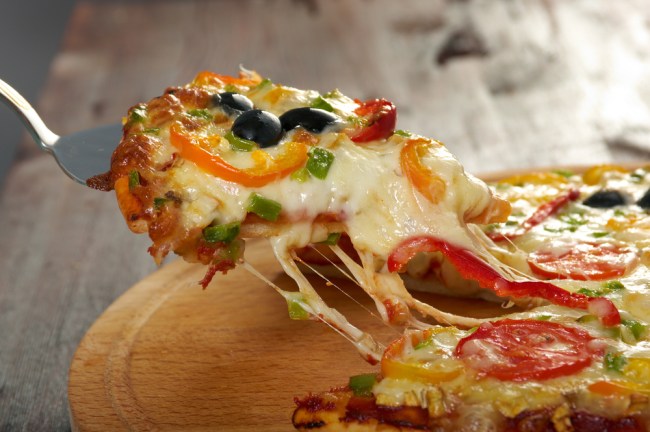
Opiate of the masses.
Unless you’re lactose intolerant, you’ve probably wondered, at some point in your life, if you might be addicted to cheese. Maybe you dabbled as a kid. Pizza, quesadillas, grilled cheese sandwiches — sticking to cheddar and mozzarella (the gateway cheeses). Perhaps your habit ramped up in college. You might not admit you had a problem, but you couldn’t fool the crew at the dining hall. There may have even been moments of weakness pre-finals when some chain gimmick like the Ultimate Cheese Lover roped you in, leading to a shameful display.
Now you’re a sophisticate. Cheese plates, Grana, European brands — the hard stuff. And when you tire of that life, you can still get a mozzarella fix at any pizza joint. Holy sh*t is it a good fix, too.
Guess what? Your self-diagnosing was right. You are addicted and you’re not alone. Americans on average eat about 23 pounds of the stuff, a number that has tripled since 1970. A study by the University of Michigan recently examined why some foods are more addictive than others. After 500 people completed the Yale Food Addiction Scale, something became abundantly clear: Cheese, and more specifically pizza, is as addictive as most drugs.
Oreo’s were up there, but cheese is the kingpin.
Further investigation revealed that the protein Casein, which is found in all dairy products, is at the root of the problem. That same protein “breaks apart during digestion to release a whole host of opiates called Casomorphins.” as Dr. Neal Barnard of the Physicians Committee for Responsible Medicine recently reported.
Now, Casein is barely detectable in normal milk, but because, on average, it takes 10 pounds of whole milk to make one pound of cheese, the problem protein is condensed and your addiction is solidified. Dietitians have reported on how Casomorphins affect your dopamine receptors: The addiction is real.
But Casomorphins aren’t all to blame. The fat associated with processed foods like french fries and Cheetos are also a major culprit. Processed foods were found to be high across the board during the study, while unprocessed foods like fish and rice were near the bottom. The catch being that many processed foods have one thing in common: “Fat seemed to be equally predictive of problematic eating for everyone, regardless of whether they experience symptoms of ‘food addiction,'” Erica Schulte, who helped conduct the study, told Mic.
There is an upshot here: On the scale of “bad addictions to have,” this one is pretty damn low. It’s not going to ruin your life, though it may expand your waistline.






